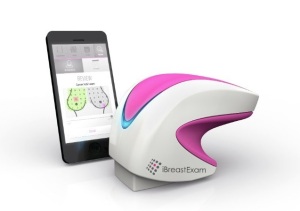by
Thomas Dworetzky, Contributing Reporter | December 12, 2016
Bringing low-cost access to breast cancer screening in India has been a challenge, but a new device developed at Drexel University by Mihir Shah and Matthew Campisi may soon change that.
“Mammography isn’t feasible in India due to high equipment cost and the lack of radiologists,” Shah
told Forbes.
The heart of the handheld device is a ceramic sensor developed at the university, where Shah went to school. These can sense changes in breast tissue that can indicate the presence of cancer.
The sensors employ a “Piezoelectric Sensor Array,” according to a report on
the news site Innovative Essence, that lets it “measure tissue compression and shear stiffness either by top down or lateral touching of the skin surface.”
This makes it “an ideal ‘electronic palpation’ sensor for in-vivo breast imaging,” it noted.
When Shah returned to India he worked to make the too-bulky prototype small enough to be used in the field in India. “I was looking to create something that could be carried in a hand.”
He received much-needed backing to refine his device in 2011 from the Health Department of the State of Pennsylvania – and subsequently saw Aarin Capital and Biocon CEO Kiran Mazumdar-Shaw, and Unitus Seed Fund put up another $4.2 million.
“Various clinical validations show that iBreastExam is an accurate test,” president of the Association of Breast Surgeons of India, Dr. Raghu Ram, told Forbes. “It won the best research paper at the recently-held Annual Conference of the Association of Breast Surgeons of India in Bengaluru this year.”
In the published clinical study of the device, which appeared in the
Indian Journal of Gynecologic Oncology in June, 989 healthy women and 20 patients with breast-related symptoms were examined three ways – the iBreastExam, a clinical breast exam by an expert doctor and breast imaging with either mammography or breast ultrasound.
The iBreastExam device had “significantly better sensitivity, by 19 percent,” over the clinical breast exams, stated the study authors, who were led by lead author S. P. Somashekhar of the Manipal Hospital, Bangalore.
In the study, “iBreastExam detected all malignant lesions,” observed the authors, concluding that “iBreastExam can be a promising tool to provide clinically effective and standardized breast examinations in low-resource settings, to detect breast lesions at early stages. The device can also be an effective screening tool for younger women with dense breasts.”
Earlier work at Drexel yielded similar findings. “The Intelligent Breast Exam can differentiate between the stiffness of normal breast tissue versus that of a tumor,” Dr. Ari Brooks, chief of surgical oncology at the College of Medicine at Drexel, said in a 2012 article about the device on the Drexel news site. “Within our clinical trials, iBE was even more effective at finding tumors in women under 40.”
The underlying tech came out of research by Dr. Wan Shih, who was led to begin the work by her own breast cancer.
“I am thrilled to see this technology move a few steps closer to being available in the clinic,”
Shih said. “It will benefit millions of women for whom mammography is not effective.”
